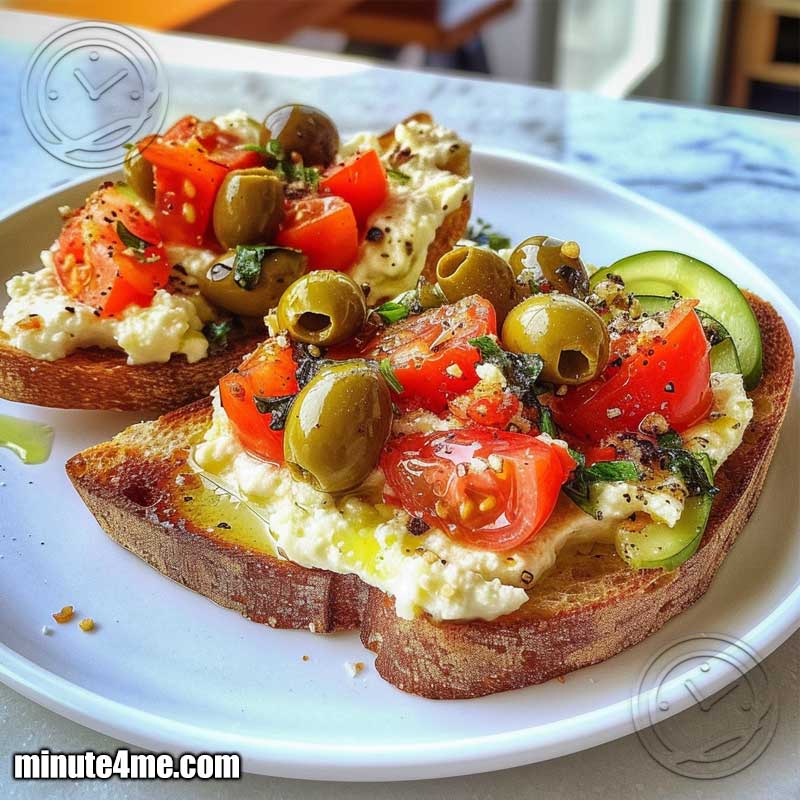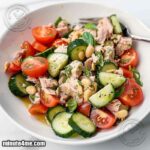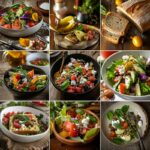Introduction to Mediterranean Diet
The Mediterranean diet, a gold standard in heart-healthy eating, is based on the traditional foods and cooking styles of countries bordering the Mediterranean Sea.
It’s not just a diet but a lifestyle that emphasizes eating primarily plant-based foods, such as fruits and vegetables, whole grains, legumes, and nuts.
What sets it apart is its liberal use of olive oil as the main fat source, replacing other fats and oils.
Fish and seafood are encouraged at least twice a week, while poultry, eggs, cheese, and yogurt should be consumed in moderation.
Red meat is suggested only sparingly.
The diet’s benefits go beyond weight loss, offering protection against heart disease, stroke, and certain types of cancer.
It also has been associated with a reduced risk of Alzheimer’s and Parkinson’s diseases.
Key components of the Mediterranean diet include:
- High consumption of fruits and vegetables: A variety of colors and types provides essential vitamins, minerals, and fiber.
- Whole grains: Foods like quinoa, brown rice, and whole-wheat bread contribute to a healthy digestive system.
- Healthy fats: Primarily from olive oil, but also found in avocados, nuts, and seeds.
- Lean proteins: Favoring fish and seafood as sources of omega-3 fatty acids, with poultry as a secondary option.
The diet also emphasizes enjoying meals with family and friends, promoting a balanced approach to eating and living.
Mediterranean Diet Dinner Options: A Guide
Dinner options within the Mediterranean diet are diverse, allowing for creativity and flavor without sacrificing nutrition.
When planning your meals, consider the balance of macronutrients – carbohydrates from whole grains and vegetables, proteins from plant and some animal sources, and healthy fats primarily from olive oil.
Here are key components to include in your Mediterranean diet dinners:
- Fish and Seafood: Rich in omega-3 fatty acids, aim for two servings per week.
- Poultry: Choose lean cuts and remove the skin before cooking.
- Beans and Legumes: Excellent sources of plant-based protein and fiber.
- Vegetables: Fill half your plate with a variety of colors and types.
- Whole Grains: Incorporate into meals as sides or part of main dishes.
- Healthy Fats: Use olive oil for cooking and dressing salads.
Is Mediterranean Diet Sustainable?
Unlock the secrets of sustainable living and vibrant health with the enigmatic allure of the Mediterranean diet. Beyond its tantalizing…
Seafood Delights: Fish and Shellfish Recipes
Seafood plays a pivotal role in the Mediterranean diet, providing key nutrients such as omega-3 fatty acids, which are crucial for heart and brain health.
Here are some seafood-based recipes that are both nutritious and flavorful:
- Grilled Salmon with Lemon and Herbs
- Ingredients: Salmon fillets, olive oil, lemon juice, garlic, fresh herbs (dill or parsley)
- Preparation: Marinate the salmon with olive oil, lemon juice, minced garlic, and herbs. Grill until cooked through.
- Shrimp and Vegetable Skewers
- Ingredients: Large shrimp, mixed bell peppers, zucchini, olive oil, lemon, salt, and pepper
- Preparation: Thread shrimp and diced vegetables onto skewers. Drizzle with olive oil and lemon juice, season, and grill.
- Tuna Salad with White Beans
- Ingredients: Canned tuna (in olive oil), canned white beans, red onion, cherry tomatoes, olive oil, vinegar
- Preparation: Mix drained tuna and beans with sliced onion and tomatoes. Dress with olive oil and vinegar.
Poultry Picks: Healthy Chicken and Turkey Dishes
Poultry, when prepared healthily, can be a delicious part of the Mediterranean diet.
Here are some dishes that highlight chicken and turkey in Mediterranean-style recipes:
- Chicken Gyros with Tzatziki Sauce
- Ingredients: Thinly sliced chicken breast, Greek yogurt, cucumber, garlic, whole-wheat pitas, lettuce, tomato
- Preparation: Marinate chicken in olive oil, lemon, and herbs. Cook and serve in pitas with tzatziki made from yogurt, cucumber, and garlic.
- Turkey and Quinoa Stuffed Peppers
- Ingredients: Bell peppers, ground turkey, cooked quinoa, tomatoes, onions, garlic, feta cheese
- Preparation: Sauté turkey with onions and garlic, mix with quinoa and tomatoes, stuff into halved peppers, top with feta, and bake.
Can Mediterranean Diet Cause Diarrhea?
Discover the secrets of the Mediterranean diet and its numerous health benefits, but beware of potential side effects like diarrhea….
Plant-Based Proteins: Beans and Legumes
Beans and legumes are foundational to the Mediterranean diet, offering a hearty source of fiber and protein without the fat content of some animal products.
Here are a few ways to incorporate them into your dinners:
- Chickpea and Spinach Stew
- Ingredients: Chickpeas, spinach, tomatoes, garlic, onion, cumin, olive oil
- Preparation: Sauté garlic and onion in olive oil, add spices, chickpeas, and tomatoes, simmer, then stir in spinach until wilted.
- Lentil and Vegetable Soup
- Ingredients: Lentils, carrots, celery, tomatoes, vegetable broth, spinach, herbs, olive oil
- Preparation: Cook lentils with diced vegetables in broth, add herbs and spinach, simmer until tender.
Vegetable-Centric Meals
Vegetables are at the heart of the Mediterranean diet, celebrated not only for their nutritional profile but for the color and texture they bring to every meal.
Aiming for a variety of colors ensures a wide range of vitamins and antioxidants.
Here are some vegetable-centric ideas:
- Roasted Mediterranean Vegetables
- Ingredients: Zucchini, bell peppers, eggplant, onions, tomatoes, olive oil, herbs
- Preparation: Toss diced vegetables with olive oil and herbs, roast until tender and slightly caramelized.
- Kale and Quinoa Salad
- Ingredients: Kale, cooked quinoa, avocado, nuts (almonds or walnuts), lemon vinaigrette
- Preparation: Toss kale and quinoa with diced avocado and nuts, dress with lemon and olive oil.
Step into the vibrant world of the Mediterranean diet and tuna, where health meets indulgence in a symphony of flavors. Tuna,…
Whole Grains for Every Meal
Whole grains are a cornerstone of the Mediterranean diet, offering essential fiber, vitamins, and minerals that contribute to digestive health and keep you feeling full longer.
Integrating whole grains into every meal is easier than it might seem, and doing so can significantly enhance your nutritional intake.
Here are some ideas for including whole grains in your dinners:
- Quinoa Salad with Vegetables and Feta
- Ingredients: Cooked quinoa, cherry tomatoes, cucumber, red onion, feta cheese, lemon dressing
- Preparation: Combine all ingredients and dress with a mixture of lemon juice, olive oil, salt, and pepper.
- Brown Rice and Vegetable Stir-Fry
- Ingredients: Cooked brown rice, a mix of bell peppers, broccoli, carrots, soy sauce, olive oil, garlic, ginger
- Preparation: Stir-fry vegetables in olive oil with garlic and ginger, then add brown rice and soy sauce, combining well.
- Whole-Wheat Pasta with Tomato Basil Sauce
- Ingredients: Whole-wheat pasta, canned tomatoes, garlic, basil, olive oil
- Preparation: Cook pasta; sauté garlic in olive oil, add tomatoes and simmer; finish with fresh basil.
Incorporating these grains into your diet not only diversifies your meal options but also aligns with the health benefits of the Mediterranean lifestyle.
Incorporating Healthy Fats
Healthy fats are another pillar of the Mediterranean diet, with olive oil leading the way.
These fats are crucial for heart health, brain function, and reducing inflammation.
Here’s how you can include more healthy fats in your Mediterranean dinners:
- Use olive oil as your main cooking fat. Whether for sautéing vegetables or dressing salads, olive oil adds flavor and health benefits.
- Incorporate avocados into salads or as a side. Their rich texture and beneficial fat content make them a perfect complement to any meal.
- Add nuts and seeds to salads, grain dishes, or as a garnish. They offer crunch, flavor, and a boost of healthy fats.
By prioritizing these sources of fats, you’ll enrich your diet with essential nutrients beneficial for long-term health.
Dinner Recipes for Every Taste
The Mediterranean diet offers a rich tapestry of flavors and ingredients, catering to a wide range of tastes and dietary preferences.
Here are some dinner recipes that showcase the diet’s diversity:
- Baked Cod with Olives and Tomatoes
- Ingredients: Cod fillets, cherry tomatoes, olives, capers, olive oil, garlic
- Preparation: Arrange cod in a baking dish, top with tomatoes, olives, capers, and garlic; drizzle with olive oil and bake.
- Vegetarian Stuffed Eggplants
- Ingredients: Eggplants, quinoa or brown rice, pine nuts, raisins, tomatoes, parsley, feta cheese
- Preparation: Halve eggplants and roast; mix cooked quinoa with nuts, raisins, tomatoes, and herbs; stuff eggplants and top with feta, bake until golden.
- Grilled Chicken with Quinoa Tabbouleh
- Ingredients: Chicken breast, cooked quinoa, cucumber, tomatoes, parsley, mint, lemon dressing
- Preparation: Grill chicken seasoned with olive oil and herbs; mix quinoa with vegetables and herbs; dress with lemon and olive oil.
Mediterranean Diet Meal Planning and Tips
Adopting the Mediterranean diet can be straightforward with some planning and creativity.
Here are tips to seamlessly integrate it into your lifestyle:
- Start with Vegetables: Plan your meals around vegetables, then add in protein and whole grains.
- Cook with Olive Oil: Replace other fats with olive oil for its health benefits and flavor.
- Make Seafood a Staple: Aim for fish or seafood twice a week for omega-3 fatty acids.
- Choose Whole Grains: Swap out refined grains for whole grains for added nutrients and fiber.
- Keep it Seasonal: Use fresh, seasonal produce to enhance flavor and nutrition.
Engaging the Family with Mediterranean Dinner
Making Mediterranean dinners a family affair can enhance the dining experience and encourage healthier eating habits.
Try these strategies to engage everyone:
- Involve them in Meal Planning: Let family members pick a dish they’d like to try.
- Cook Together: Assign tasks based on age and skill level to involve everyone in the meal preparation.
- Explore New Foods: Introduce a new vegetable, grain, or protein each week to expand your culinary horizons together.
Conclusion
The Mediterranean diet is much more than a list of foods; it’s a sustainable approach to eating that emphasizes health, flavor, and the joy of sharing meals with others.
By incorporating a variety of vegetables, whole grains, lean proteins, and healthy fats into your dinners, you can enjoy the full spectrum of benefits this lifestyle offers.
With these recipes and tips, you’re well-equipped to embrace Mediterranean dinners that nourish both body and soul.







